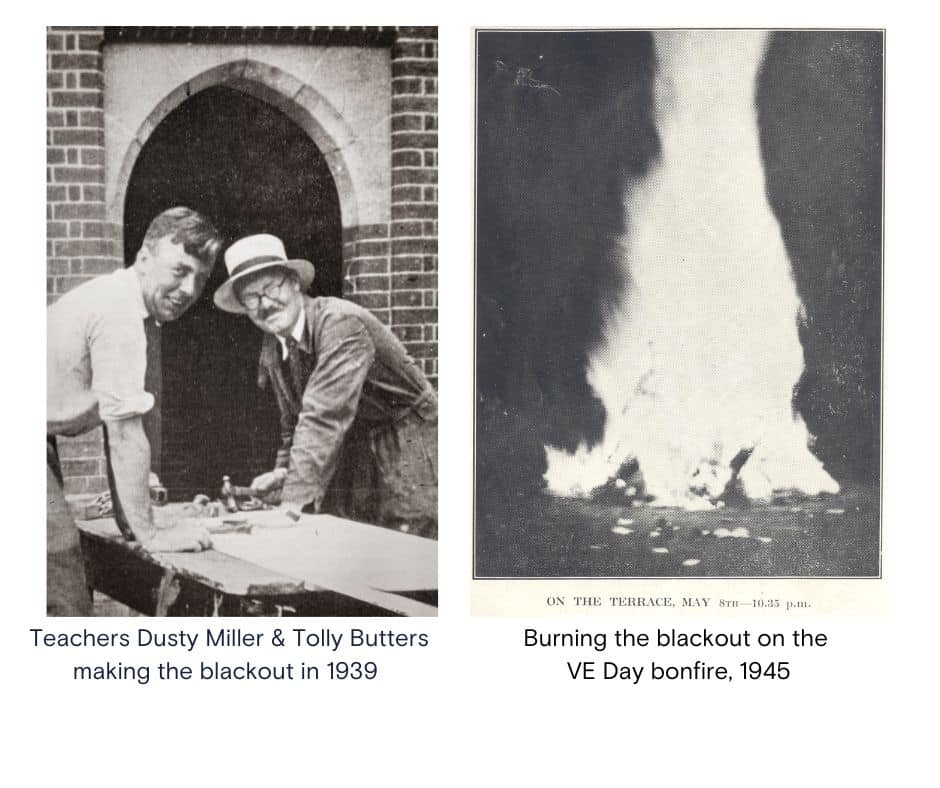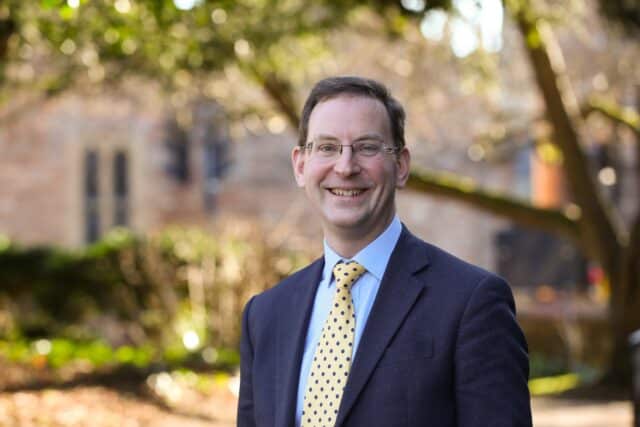
On 8 May 1945, the war in Europe ended. Celebrations erupted all over Britain, and Ardingly College was no exception. 12000 square feet of black-out material burned on a huge bonfire on the Terrace, and “powerful homemade fireworks added to the fun. The lights went on again, and shone cheerfully through the darkness for the first time for over five years – a symbol in a real sense of what victory means to all who love light and truth.” [Annals Editorial, July 1945]
The wartime Annals are an incredibly valuable contemporary record of wartime Ardingly, and the July 1945 issue – the first after VE Day – features written contributions from a range of staff, from the manager of the tuck shop to a sanitorium sister, and the head cook to the headmaster’s wife. Thanks to Mrs Crosse – wife of Rev EC Crosse, headmaster 1933-46 – we have a wonderfully detailed account of the College during the war. Of VE Day she wrote:
“Then came the great day when we could do away with [the black-out] altogether. I must say I felt quite sentimental as I peeled off layer after layer of paste and paper and remembered those hectic but jolly days six years ago when we had first tackled the job. The present generation of boys did not suffer from these sentimental reactions, in fact, to them it was just a new form of punishment to be sent to de-black a window. VE Day arrived, and with it the rite to which we had all looked forward so long – the burning of the black-out and the end of all it had meant. As the fire died down and the lights were turned on and streamed out across the grass, I realized at last that the war in Europe was really over.”
VE Day was hugely impactful for Mrs Crosse, and the bonfire a meaningful symbol of peace. But what of the boys themselves? What did the end of war in Europe – and the celebrations at the College – mean to them?
There were 371 boys on the school roll on 8 May 1945. 80 years later, we’ve spoken to five of them – then aged 9 to 18, now 89 to 98 – about what it was like to be at Ardingly College during the war. And today, on 8 May 2025, the 80th anniversary of VE Day, we’re sharing their memories of this historic day.
The clips below are all from our Voices from wartime Ardingly oral history project, which will be shared in more depth in the coming months – stay tuned!
Sir Andrew Bowden (1946)
Finding out (Senior School)
“Something in my memory tells me that the headmaster got up at school assembly and said, ‘The war is over and we have won’.”
Celebrations
“I certainly remember the party that we had on the Terrace. It was a great celebration and we were all, frankly we were all running a bit wild! [laughter] I took the opportunity [laughter] to go and walk round the Headmaster’s garden, which was normally, you know, absolutely and totally and completely out of bounds.”
Colin Moram (1948)
How it felt & the bonfire
“Rejoice… at the end of the war! Because there was black-out on all the windows. There was a big bonfire made of all the black-out stuff.”
Thunder flashes
“[Laughter] One of those things that, while we were all gathering round, I can’t quite remember if there were special meals or drinks or whatever, but RSM Hole threw what we called thunder flashes, they were simulations, when we had field days, of hand grenades, throwing those up from the Head’s garden over the top of the Terrace wall, which was interesting. Probably get put in prison these days if you were to do that! Ha.”
Geoffrey Jackson (1949)
How it felt
“Just delirious, really, like everyone else in the country… so amazing. We thought things would improve immediately but of course they didn’t. Things like rationing and that sort of thing.”
The bonfire & thunder flashes
“In those days the Terrace was paved in sort of pink pave stones, I think they’ve gone now, but there was a massive great bonfire on the Terrace. And when it was all cleared away the next day it had wrecked half a dozen paving stones, just cracked them with the heat, which rather upset our roller hockey on the Terrace. And there was George Markwick, who I think was sort of gym instructor and also the corps, he was charging around the place chucking thunder flashes everywhere. [Interviewer: What are thunder flashes?] Oh! They’re dummy… they’re used in training, military training, they’re big bangers, really.”
Peter Lane (1953)
Finding out (Junior House)
“We were told, I do remember Mr Ingram saying the war is ending today, or whatever. I was very surprised that there wasn’t some sort of recognition of it, it was just like any other school day. We just had lessons and all that, and I was very excited because I thought the war’s over and it had taken up nearly half my life and I was all pleased about it but I thought there, I do remember thinking there ought to be some sort of recognition or celebration. And then we were told that there was going to be this big bonfire on the on the Terrace.”
The bonfire
“We all from JH, we didn’t go on to that part of the school, usually, but we were taken onto the Terrace and shown the bonfire all being built and then it was built. It was all very high, it was very tall.”
“There was a very lifelike effigy of Hitler on the top. And I learnt, many years later I discovered in fact, it was made up with all the black-out materials that the schools had used to black the schools out at night time so that no lights showed, but I didn’t know that then, I didn’t think about it.”
“They lit the bonfire, and it was getting dark, and it was huge flames, it must have looked quite impressive from the viaduct, I would think, and we, well, basically stood and watched this bonfire [laughter]… As it died down and the flames were much lower, some of the boys from the senior school were jumping across it, you know, and sort of jumping through the flames a bit, that sort of thing.”
Singing round the fire
“And the final one, the final song, was Auld Lang Syne, I do remember that, it was the first time I’d ever heard it in my life, and we all crossed arms, I didn’t know the words or anything about what it was about and… what I do remember was, on my immediate right there was a mistress, a school mistress, called Miss Bain – B-A-I-N – I hadn’t dealt with her, she was a middle aged lady and we crossed arms and she was singing loudly Auld Lang Syne, you know.”
What next?
“What I didn’t know, because I was only a youngster, we’d only been, as far as I was concerned, fighting Germans. What I didn’t know was that we were still fighting Japanese, but that didn’t worry me because, you know, it was the bombing, of course, which had always been terrifying and so… I knew there would be no, that was what people rejoiced about, there’d be no more bombing.”
Roger Adcock (1945)
The bonfire and atmosphere
“Oh yes and we had a big bonfire that night, I remember, to mark the end of the war… in fact, I think in the Annals of that time there’s a sort of… a sketch of the bonfire, if you look up that 1945 edition. I’ve got an edition somewhere, so… [Interviewer: And so was there an atmosphere of celebration then amongst the school community?] Oh heavens, yes! Yes, yes, yes, there really was.”





